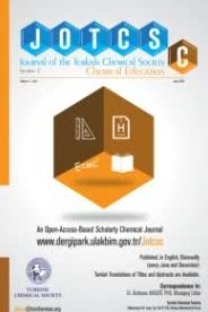Kara kutu deneylerinin özel yetenekli öğrencilerin eleştirel düşünmelerine etkisi
Bu araştırmanın amacı; özel yetenekli bireylerin eğitiminde zenginleştirme çalışmalarında kara kutu deneyleriyle eleştirel düşünmelerini geliştirmektir. Araştırma 2017-2018 öğretim yılında Ankara ilinde özel yetenekli bireylerle öğretim yapan bir okulda 16 özel yetenekli bireyle durum çalışması temelinde yürütülmüştür. Veri toplama aracı olarak yedi adet kara kutu deneyini argüman olarak kurgulatan öğretim dizini çalışma yaprakları ile öğrenci gözünden sürecin değerlendirilmesini amaçlayan çalışma yaprakları kullanılmıştır. Veri toplama sürecinde özel yetenekli öğrenciler önce deneyleri kara kutulu olarak büyük grup tartışmalarıyla sorgulamışlar, kendi bireysel argümanlarını yapılandırmışlardır. Daha sonra ise deneylerin açık yürütülmesiyle kendi düşünme süreçlerini irdelemiş, neyi ne kadar doğru yaptıklarını izlemeyi deneyimlemişlerdir. Ayrıca sürecin öğrenci gözünden değerlendirilmesi de yapılmıştır. Veriler içerik analiziyle çözümlenmiştir. Araştırma sonucunda özel yetenekli bireylerin kara kutu deneylerini sorgulama ve argüman olarak kurgulama, en sonunda da kendi düşünme süreçlerini irdeleme suretiyle eleştirel düşünebildikleri bulunmuştur. Ayrıca öğrenci gözünden sürecin değerlendirmesi de anlamlı ve eğlenerek öğrenmenin yanı sıra kendilerinin düşünme süreçlerinin takibine vurgu yapmıştır.
Anahtar Kelimeler:
Özel yetenekli eğitimi, zenginleştirme, kimya öğretimi, kara kutu deneyleri, eleştirel düşünme
The Effect Of Black Box Experiments To Gifted Students’ Critical Thinking
The purpose of this research is to investigate the effect of black box experiments on gifted students’ critical thinking for the enrichment of gifted education. The research was conducted on 16 gifted students educating at a science and art center, in Ankara province in the 2017-2018 academic year on the basis of case study. The teaching guide containing the reconstruction of seven black box experiments as arguments and worksheets making students evaluate the research process were utilized as data collecting tools. During the application process, first the students questioned each of the black box experiments in big group discussions and reconstructed each of the black box experiments as arguments individually. Moreover, the experiments were done again without boxing any process of the experiments; therefore, the students were able to question whether their arguments were adequate or not. At the end, the students evaluated the whole process too. The content analysis was utilized for the data analysis. As a result of the investigation, the gifted students have been found to criticize black box experiments by questioning and reconstructing them as arguments, and finally examining their own thinking processes. Also student process evaluation referred to meaningful learning, enjoyable learning and the use of critical thinking.
Keywords:
özel yetenekli eğitimi gifted education, enrichment, chemical education, black box experiments, critical thinking,
___
- Bilim ve Sanat Merkezleri Yönergesi (2016), http://orgm.meb.gov.tr sayfasından erişilmiştir.
- Büyüköztürk, Ş., Kılıç Çakmak, E., Akgün, Ö. E., Karadeniz, Ş., & Demirel, F. (2010). Bilimsel Araştırma Yöntemleri. Ankara: Pegem.
- Cambridge International Examinations (CIE) (2011) Thinking Skills Syllabus 9694, http://www.cie.org.uk sayfasından erişilmiştir.
- Demircioğlu, H., & Vural, S. (2016). Ortak bilgi yapılandırma modelinin sekizinci sınıf düzeyindeki üstün yetenekli öğrencilerin kimya dersine yönelik tutumları üzerine etkisi. Hasan Ali Yücel Eğitim Fakültesi Dergisi, 13(1), 49-60.
- Demircioğlu, H., Vural, S., & Boz, I. (2016). Periyodik tabloda elementlerin yerini bulmada farklı bir bakış açısı. Üstün Zekâlılar Eğitimi ve Yaratıcılık Dergisi, 3(1), 43-50.
- Erickson, E. (2004). Demystifying data construction and analysis. Anthropology and Education, 35(4), 486-493.
- Hefter, M. H., Berthold, K., Renkl, A., Riess, W., Schmid, S., & Fries, S. (2014). Effects of a training intervention to foster argumentation skills while processing conflicting scientific positions. Instructional Science, 42, 929-947.
- Kettler, T. (2014). Critical thinking skills among elementary school students: Comparing identified gifted and general education student performance. Gifted Child Quarterly, 58(2), 127-136.
- Lim, L. (2011). Beyond logic and argument analysis: Critical thinking, everyday problems and democratic deliberation in Cambridge International Examinations’ Thinking skills curriculum. Journal of Curriculum Studies, 43(6),783-807.
- Nussbaum, E. M., & Edwards, O. V. (2011). Critical questions and argument stratagems: A framework for enhancing and analyzing students’ reasoning practices. The Journal of the Learning Sciences, 1-46.
- Osborne, J., Erduran, S., & Simon, S. (2004). Enhancing the quality of argumentation in school science. Journal of Research in Science Teaching, 41(10),994-1020.
- Rogers, K. B. (2007). Lessons learned about educating the gifted and talented: A synthesis of the research on educational practice. Gifted Child Quarterly, 51(4), 382-396.
- Stoeger, H., Hopp, M., & Ziegler, A. (2017). Online mentoring as an extracurricular measure to encourage talented girls in STEM: An empirical study of one-on-one versus group mentoring. Gifted Child Quarterly, 61(3), 239-249.
- Subotnik, R. F., Olszewski-Kubilius, P., & Worrell, F. C. (2011). Rethinking giftedness and gifted education: A proposed direction forward based on psychological science. Psychological Science, 12(1), 3-54.
- Tezcan, H., & Günay, S. (2003). Lise kimya öğretiminde laboratuvar kullanımına ilişkin öğretmen görüşleri. Milli Eğitim Dergisi, 159.
- Tüzün, Ü. N., Eyceyurt Türk, G., Harmancı, A. B., & Ertem, N. (2017, Ekim). Bilim eğitiminde üstün zekâlı bireylerin düşünce deneyleriyle eleştirel düşünme becerilerinin geliştirilmesine yönelik bir öğretim dizini yapılandırma. Uluslararası Eğitim Yönetimi Forumu 8’de sunulmuş bildiri, TOBB Üniversitesi, Ankara.
- Vural, S. (2010). Yapılandırmacı yaklaşıma uygun geliştirilen etkinliklerin üstün yetenekli öğrencilerin kavramları anlamalarına etkisi: ‘Erime, donma, buharlaşma, kaynama ve yoğuşma’. Yüksek Lisans Tezi, Karadeniz Teknik Üniversitesi Fen Bilimleri Enstitüsü, Trabzon.
- Walton, D. (2006). Fundamentals of critical argumentation. New York USA: Cambridge University.
- West, T. L. (1994). The effect of argumentation instruction on critical thinking skills. Doctoral Dissertation, Southern Illinois University, Chicago.
- Yoon, C. H. (2009). Self-regulated learning and instructional factors in the scientific inquiry of scientifically gifted Korean middle school students. Gifted Child Quarterly, 53(3), 203-216.
- Zohar, A., & Nemet, F. (2002). Fostering students’ knowledge and argumentation skills through dilemmas in human genetics. Journal of Research in Science Teaching, 39(1), 35-62.
- Başlangıç: 2016
- Yayıncı: Türkiye Kimya Derneği
